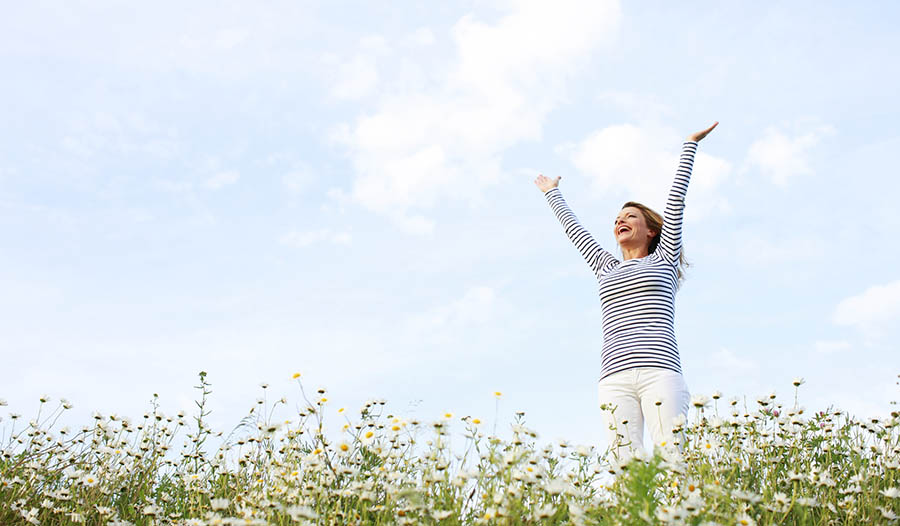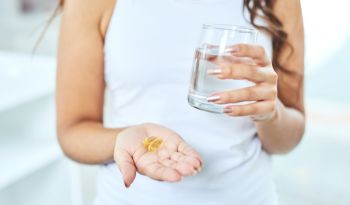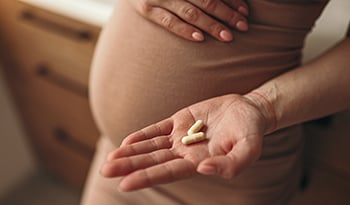Menopause: Symptoms, Foods, + Natural Approaches for Relief

These statements have not been evaluated by the Food and Drug Administration. This information is not intended to diagnose, treat, cure, or prevent any disease.
What Is Menopause?
For most women, menopause is marked by the end of monthly menstruation when there are no longer active follicles housing eggs in the ovaries. During this time, levels of estrogen and progesterone fluctuate and then decrease. Menopause is characterized by complex changes in vascular function, thermoregulation, and neurochemical balance that can influence body temperature control, mood, and overall well-being.
When Does Menopause Occur?
This natural process usually occurs when a woman reaches around fifty, but may occur as early as 40 and as late as 55.
Symptoms Of Menopause
With menopause comes the end of menstruation and a set of common symptoms:
- Hot Flashes
- Headaches
- Vaginal Dryness or Discomfort
- Bladder Irritation
- Cold Hands and Feet
- Forgetfulness
- Mood changes
- Inability To Concentrate
Fortunately, there are natural approaches to lessen the severity of these symptoms, which will be discussed in this article.
Best Foods For Menopause
The key dietary recommendation to relieve menopausal symptoms is to increase the intake of plant foods, especially those high in phytoestrogens, while reducing intake of high-fat animal foods and sugar.1
Phytoestrogens are plant compounds capable of binding to estrogen receptors and may help support the body’s natural response to changing hormone levels during menopause. Phytoestrogens are much weaker than estrogen. That is also why diets rich in phytoestrogens are frequently recommended to help support healthy estrogen metabolism and cellular health.
A high intake of phytoestrogens is thought to explain why hot flashes and other menopausal symptoms rarely occur in cultures in which people consume a predominantly plant-based diet.2
Foods high in phytoestrogens:
- Ground Flaxseeds
- Soybeans
- Soy Foods
- Nuts and Seeds
- Whole Grains
- Apples
- Fennel
- Celery
- Parsley
- Alfalfa
Increasing the intake of dietary or supplemental phytoestrogens helps decrease hot flashes, promotes cardiovascular health, and supports bone health.2-5 Ground flaxseed consumption is particularly helpful. Women who consumed 2 tablespoons of ground flaxseeds twice daily cut the number and severity of their hot flashes by over 50% within 6 weeks.6 Ground flaxseed intake has also been shown to help improve cardiovascular health.7
Best Supplements For Menopause
Magnesium
Low dietary magnesium intake is common in developed countries. When dietary magnesium levels are low, it may contribute to the development of hot flashes by making blood vessels more sensitive to hormonal changes during menopause.
Researchers at Virginia Commonwealth University found that supplementing magnesium to restore proper tissue levels made blood vessels more stable and less reactive to hormonal changes, thereby reducing hot flashes in menopausal women.8 For best results, use the citrate or bis-glycinate form; 150 to 250 mg three times daily is generally recommended.
Pine Bark and Grape Seed Extract
Pine bark and grape seed extracts are sources of PCOs (Procyanidolic oligomers), a type of flavonoid. Clinical studies with these extracts have shown significant benefits to the health of blood vessels.
As it relates to menopausal symptoms, studies with PCO extracts have shown impressive results when given at a dosage of 100 mg twice daily in lowering hot flashes, night sweats, and mood swings, as well as improving overall cardiovascular health. For example, in one double-blind, placebo-controlled study, 96 women with at least one menopausal symptom were given either grape seed extract at a low dose (100 mg/day) or high dose (200 mg/day) or placebo for 8 weeks.9
Results showed significant improvements in hot flashes, sleep quality, and cardiovascular function, with the 200 mg per day grape seed extract dosage producing the best results. Muscle mass also increased with grape seed extract, presumably due to its antioxidant effects, preventing aging-related muscle loss.
Estro-G 100
Estro-G 100 is a well-researched herbal supplement for menopausal symptoms composed of standardized extracts of three plants (Cynanchum wilfordii, Phlomis umbrosa, and Angelica gigas) used in traditional Korean medicine.
Significant research, including numerous preclinical studies and four double-blind, placebo-controlled human clinical trials, has been conducted on Estro-G 100. In the four clinical trials, EstroG-100® was shown to produce significant improvement in supporting overall comfort during menopause, including hot flashes, sleep disturbances, nervousness, dizziness, fatigue, joint discomfort, and vaginal dryness. No adverse effects have been reported with Estro-G 100 use.12-15
Black Cohosh (Cimicifuga racemosa)
Black cohosh extract is one of the most well-researched natural approaches to menopausal comfort. Most, but not all, studies show very positive results.16 In the largest study of 629 women with menopausal complaints, as early as 4 weeks after starting supplementation with black cohosh extract, a clear improvement in menopausal complaints was seen in approximately 80% of these women.17 After 6 weeks of supplementation, more than 50% of the women experienced improvement in overall menopausal comfort.
In one of the most positive double-blind studies, when 80 patients were given either black cohosh extract (two tablets twice daily, providing 4 mg 27-deoxyacteine daily), conjugated estrogens (0.625 mg daily), or placebo for 12 weeks, the black cohosh extract produced the best results.18 The number of hot flashes experienced each day dropped from an average of 5 to less than 1 in the black cohosh group. In comparison, the estrogen group dropped from only 5 to 3.5. Even more impressive was the effect of black cohosh on building up the vaginal lining.
St. John’s Wort (Hypericum perforatum)
Most people are likely familiar with the clinical research on St. John’s Wort extract in boosting mood, but it has also shown considerable benefits in improving menopausal symptoms, including hot flashes. The results are generally seen in the second month of supplementation. In one double-blind study of women going through menopause, St. John’s wort extract (900 mg three times daily) significantly reduced the frequency and severity of hot flashes after three months of supplementation. They also reported significant improvements in quality-of-life scores and sleep quality.19
Maca (Lepidium meyenii)
The maca plant has a turnip-shaped root that is still consumed as food in its native area of the northern Puna region of Peru and Bolivia, where it grows just above the tree line but below the permanent snow cap. Maca is the highest-elevation food crop in the world. Maca has been treasured for thousands of years for its ability to increase energy, stamina, and fertility.
Preclinical research indicates the plant’s beneficial effects may include supporting the function of the control centers of the endocrine system (the hypothalamus and pituitary) as well as acting directly on the endocrine glands (e.g., the ovaries, adrenals, and thyroid). In two double-blind, placebo-controlled studies in women going through menopause, maca supplementation is of benefit in reducing hot flashes and supporting sleep quality, mood, and energy levels.20,21
Shatavari (Asparagus racemosus)
Shatavari is an herb used in Ayurveda that has also been referred to as the "Queen of Herbs" or "she who possesses 100 husbands. Modern clinical research has identified shatavarins, the plant’s key steroidal saponins, as bioactive compounds that support vascular stability, healthy thermoregulation, and endocrine balance. Human studies suggest standardized Asparagus racemosus extracts may help reduce the frequency and intensity of hot flashes while supporting overall menopausal comfort. Asparagus racemosus has also been studied for its adaptogenic and neuroendocrine effects, supporting the body’s ability to respond to stress and hormonal transitions. Research indicates it may help promote emotional well-being and resilience during menopause by supporting balanced neurotransmitter and stress-response pathways.22,23
Summary
Menopause is a transformative phase that affects women differently. From barely noticeable to debilitating, the severity of complaints varies. But fret not. There are recommendations to help!
- Start by following the dietary guidelines: embrace foods rich in phytoestrogens and add two tablespoons of ground flaxseeds to your daily routine.
- Magnesium matters! Take 250 to 400 mg at night to aid with hot flashes and promote restful sleep. It's a pervasive issue, so don't miss out!
- Grapeseed or pine bark extract offers more than hot flashes and cardiovascular wellness. Take at least 200 mg daily.
- Herbal approach matters, too! Choose based on your significant complaints:
- EstroG-100 for a wide range of symptoms
- Black cohosh for hot flashes and vaginal dryness
- St. John's wort extract to support a healthy mood
- Maca for energy and perhaps a boost to sexual desire
- Shatavari for both hot flashes and emotional well-being
Remember, your journey is unique! Take care of yourself during this transformative phase.
References:
- Herber-Gast GC, Mishra GD. Fruit, Mediterranean-style, and high-fat and -sugar diets are associated with the risk of night sweats and hot flushes in midlife: results from a prospective cohort study. Am J Clin Nutr. 2013;97(5):1092–1099.
- Patra S, Gorai S, Pal S, Ghosh K, Pradhan S, Chakrabarti S. A review on phytoestrogens: Current status and future direction. Phytother Res. 2023 Jul;37(7):3097-3120.
- Barnard ND, Kahleova H, Holtz DN, et al. A dietary intervention for vasomotor symptoms of menopause: a randomized, controlled trial. Menopause. 2023 Jan 1;30(1):80-87.
- Durazzo A, Carcea M, Adlercreutz H, et al. Effects of consumption of whole grain foods rich in lignans in healthy postmenopausal women with moderate serum cholesterol: a pilot study. Int J Food Sci Nutr. 2014 Aug;65(5):637-45.
- Rattanatantikul T, Maiprasert M, Sugkraroek P, Bumrungpert A. Efficacy and Safety of Nutraceutical on Menopausal Symptoms in Post-Menopausal Women: A Randomized, Double-Blind, Placebo-Controlled Clinical Trial. J Diet Suppl. 2022;19(2):168-183.
- Pruthi SL, Thompson PJ, Novotny DL, et al. Pilot evaluation of flaxseed for the management of hot flashes. J Soc Integ Oncol. 2007;5(3):
- Parikh M, Maddaford TG, Austria JA, et al. Dietary Flaxseed as a Strategy for Improving Human Health. Nutrients. 2019 May 25;11(5):1171.
- Park H, Parker GL, Boardman CH, Morris MM, Smith TJ. A pilot phase II trial of magnesium supplements to reduce menopausal hot flashes in breast cancer patients. Support Care Cancer. 2011 Jun;19(6):859-63.
- Terauchi M, Horiguchi N, Kajiyama A, Akiyoshi M, Owa Y, Kato K, Kubota T. Effects of grape seed proanthocyanidin extract on menopausal symptoms, body composition, and cardiovascular parameters in middle-aged women: a randomized, double-blind, placebo-controlled pilot study. Menopause. 2014 Sep;21(9):990-6.9. 109.
- Yang H-M, Liao MF, Zhu S-Y, et al. A randomised, double-blind, placebo-controlled trial on the effect of Pycnogenol on the climacteric syndrome in perimenopausal women. Acta Obstetricia et Gynecologica. 2007;86:978–985.
- Luzzi R, Belcaro G, Hosoi M, et al. Normalization of cardiovascular risk factors in peri-menopausal women with Pycnogenol®. Minerva Ginecol. 2017;69(1):29–34.
- Farzaneh F, Fallah G, Khalili-Chelik A, Fallah A, Hosseini M. Estro G-100 herbal extract and hot flashes in postmenopausal women: A randomized double-blinded controlled trial. Explore (NY). 2023 Sep 19:S1550-8307(23)00224-0.
- Kim T, Ryu KJ, Lee S, et al. A 12-Week, Multi-Center, Double-Blind, Randomized, Placebo-Controlled Clinical Trial for the Evaluation of the Efficacy and Safety of the Herbal Extract (EstroG-100®) on Menopausal Symptoms. HSOA J Reprod Med Gynaecol Obstet.2022;7:106.
- Chang A, Kwak BY, Yi K, Kim JS. The effect of herbal extract (EstroG-100) on pre-, peri- and post-menopausal women: a randomized double-blind, placebo-controlled study. Phytother Res. 2012 Apr;26(4):510-6.
- Lee KH, Lee DJ, Kim SM, et al. Evaluation of effectiveness and safety of natural plants extract (Estromon®) on perimenopausal women for 1 year. J Menopausal Med 2005;11:16-26.
- Borrelli F, Ernst E. Cimicifuga racemosa: a systematic review of its clinical efficacy. Eur J Clin Pharmacol. 2002;58:235–24
- Stolze H. An alternative to treat menopausal complaints. Gyne 1982;3:14–16.
- Stoll W. Phytopharmacon influences atrophic vaginal epithelium. Double-blind study—Cimicifuga vs. estrogenic substances. Therapeuticum 1987;1;23–31.
- Abdali K, Khajehei M, Tabatabaee R. Effect of St. John’s wort on severity, frequency, and duration of hot flashes in premenopausal, perimenopausal and postmenopausal women: a randomized, double-blind, placebo-controlled study. Menopause. 2010;17(2):326–331.
- Meissner H, Mscisz A, Reich-Bilinska R, et al. Hormone-balancing effect of pre-gelatinized organic maca (Lepidium peruvianum Chacon): (III) Clinical response of early-postmenopausal women to Maca in a doubleblind, randomized, placebo-controlled, crossover configuration, outpatient study. Int J Biomedical Science. 2006;2(4):375–394.
- Brooks NA, Wilcox G, Walker KZ, et al. Beneficial effects of Lepidium meyenii (Maca) on psychological symptoms and measures of sexual dysfunction in postmenopausal women are not related to estrogen or androgen content. Menopause. 2008 Nov-Dec;15(6):1157-62.
- Ademola J, Ajgaonkar A, Debnath T, Debnath K, Langade J. Efficacy and safety of Shatavari root extract (Asparagus racemosus) for menopausal symptoms: a randomized, double-blind, three-arm, placebo-controlled study. Front Reprod Health. 2025 Nov 27;7:16545.
- Yadav P, Yadav S, Vedururu SS, Kumari G. A Standardized Asparagus Racemosus Root Extract Improves Hormonal Balance and Menstrual Health and Reduces Vasomotor Symptoms in Perimenopausal Women: A Randomized, Double-Blind, Placebo-Controlled Study. J Am Nutr Assoc. 2025 Nov-Dec;44(8):754-764.
DISCLAIMER:This Wellness Hub does not intend to provide diagnosis...
















































































 Table of Contents
Table of Contents















